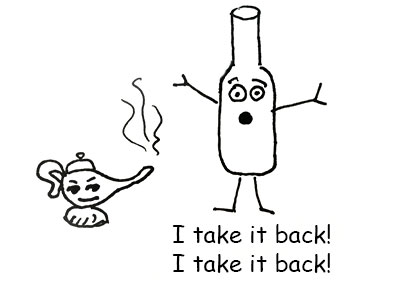
I wish I were a little bottle of pop.
I wish I were a little bottle of pop.
I’d go down with every slurp,
And come up with every burp.
I wish I were a little bottle of pop.
—Summer Camp Song

You may never have heard the term subjunctive case before, or don’t remember it from Spanish class if you have, but knowing this rule and following it will make your speech and writing much better with just a little effort.
The subjunctive is used when you are expressing “various states of unreality.” (I could give you a very long explanation from the ancient Latin why this is so, but I’ll skip it.)
Past Tense
When the past tense of “to be” is involved, the subjunctive is indicated by using “were” regardless of whether the subject is singular or plural.
A fact: Joe was rich.
A wish: Joe wishes he were rich.
A fact: She is tall enough to reach the counter.
A supposition: If she were tall enough, she could reach the counter.
An explanation: Katie told me she was there at the time.
A possibility: I wonder if Katie were there at the time.
An opinion: Doing the butterfly is easy.
A dissenting opinion: The swimming instructor acted as if doing the butterfly were easy.
An action: We told you what the president said last night.
An option: If what the president said were true, we would have told you.
In fact, if you are using the subjunctive correctly, you can even cut down on your words:
Were what the president said true, we would have told you.
Were she just another girl, you wouldn’t mind so much.
Present Tense: To Be
When the present tense of “to be” is involved, the subjunctive is indicated by using “be” instead of “is” or “are.”
An action: Ronald was invited to join the chess club.
A recommendation: We recommended Ronald be invited to join the chess club.
A fact: Sheena is highly paid.
An opinion: It is important that Sheena be highly paid.
Other Verbs
When the past or present tense of other verbs is involved, the subjunctive is indicated by using the present indicative (which is basically the infinitive version minus the “to”). Remember, this means that the verb is indicating something that isn’t actually happening at that moment.
An action: The little brat leaves the theater.
An opinion: I insist that the little brat leave the theater.
An action: She walks down three blocks and then turns left at the light.
Giving directions: You walk down three blocks and turn left at the light.
An action: The happy girl ate all her candy.
An order: The Candyman demanded the scared girl eat all her candy.
Oddly, though this third group is the most complicated, I hardly ever find I have to fix it when editing. That “I wish I were” thing, however, I find I have to fix all the time.
And now, if you’re old enough, you’ve probably been thinking about this one:
I’d love to be an Oscar Mayer wiener.
That is what I’d truly like to be.
‘Cause if I were an Oscar Mayer wiener,
Everyone would be in love with me.
Julia H.
Get a free sample proofread and edit for your document.
Two professional proofreaders will proofread and edit your document.
Get a free sample proofread and edit for your document.
Two professional proofreaders will proofread and edit your document.
We will get your free sample back in three to six hours!